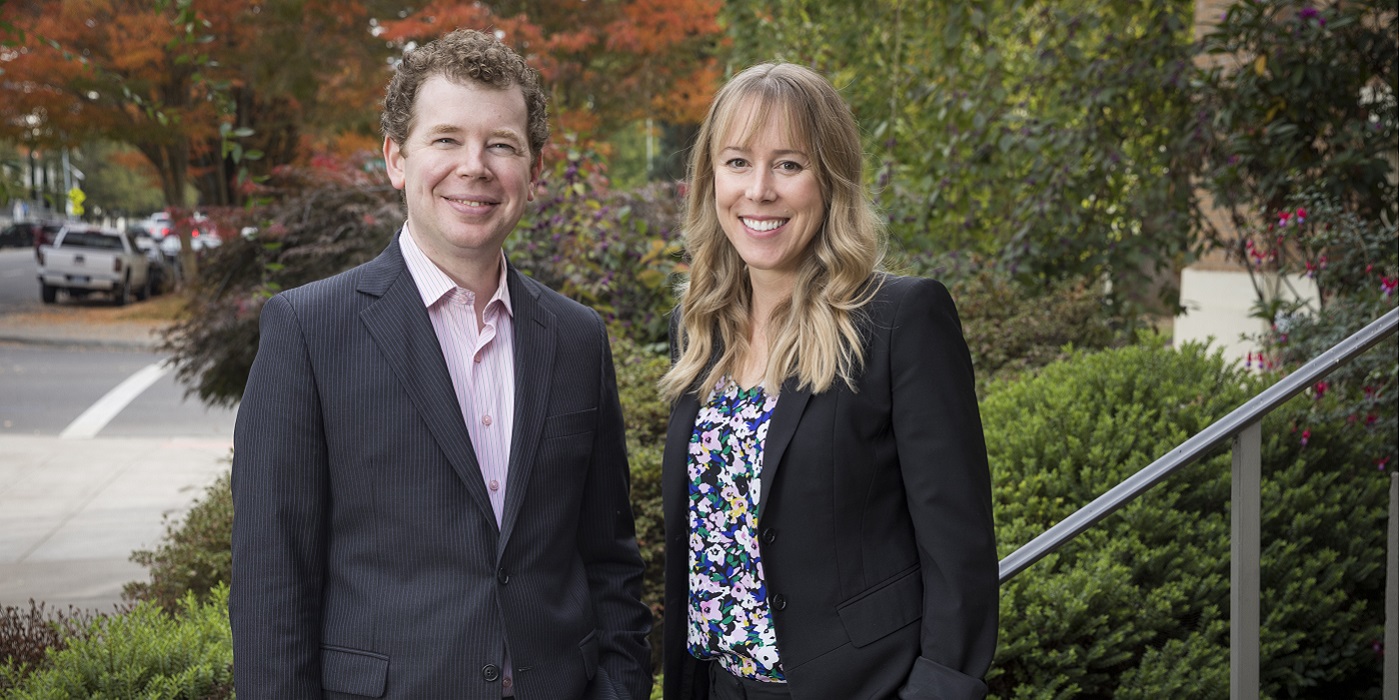Two of Willamette Law's business scholars and professors earned promotions this past March. Professor Karen Sandrik, who is also associate dean for faculty, celebrated a decade at Willamette in 2022 and was promoted to full professor. Professor Aaron Simowitz, who has taught for six years at Willamette, was granted tenure and is now an associate professor.
Promotions are a recognition that faculty members have shown excellence in three areas of service - writing and research, teaching, and service and commitment to the law school. Since beginning their journeys in academia, Sandrik and Simowitz have each taken on expanded roles at Willamette Law.
Professor Karen Sandrik
Becoming a full professor is the culmination of many years of work, Sandrik says.
"You work hard to get a tenure-track position, then to earn tenure, and after tenure, to continue growing and evolving, both as a national authority in your respective research area and as an effective and engaging teacher in the classroom."
For the former Division I college athlete, it feels good to be "on the playing field" as a legal expert in intellectual property licensing law and patent law. It is gratifying to feel her work is recognized and making a difference, she says.
When she first began teaching, she focused on gaining a base of knowledge. Now, she knows the case law and follows current legislation, enabling her to go deeper in her current scholarly work and classes. Her most recent published article "An Empirical Study: Willful Infringement and Enhanced Damages in Patent Law After Halo" is the result of many years of work.
"I compiled an original dataset spanning from 2010-2020 of all opinions involving allegations of willfulness and enhanced damages," she says. "This level of project, the depth and the analysis of the data is not something I could have done in my early years at Willamette. I needed time to build my knowledge and understanding of the law and scholarly literature."
"The neat thing is that as you continue to become a better, more researched scholar, you can have better, more researched ideas that have greater impacts," she explains. "I think the same is true for teaching."
Sandrik is now teaching courses that are completely problem-based, using real-world companies as examples and bringing law to life for her students. As a full professor, Sandrik will also continue in service to the profession, playing a part in hiring, academic affairs and other committees. In her role as associate dean for faculty, she is a guide for her peers.
"The research, the teaching, the service - all of this has better prepared me to support our faculty and facilitate the law school's growth," she says.
Although she is no longer co-director of the Business Lawyering Institute (BLI), it is a passion project for her, and she's stayed involved. She continues to direct the Business Law Certificate Program, Willamette Law's most popular specialty training program.
"It feels like yesterday since I started," she says, "but on the other hand, it feels like I've been at Willamette my entire career. I'm still enjoying it and have so much to learn."
Professor Aaron Simowitz
Simowitz also finds it hard to believe how many years have passed since beginning at Willamette Law. He's grateful for his colleagues at the university for the recognition that a promotion to associate professor brings.
"It's really nice to know that an institution I like a lot likes me back," he says. "I feel like maybe in another six or 60 years, I might start getting the hang of this."
Simowitz says one reason he was initially hired by Dean Emeritus Curtis Bridgeman was because of his interest in experiential learning and simulation-based teaching. In the years since he was hired, the College of Law has expanded on that approach to teaching, making his experience invaluable.
He has worked to bring experiential opportunities to the 1L classroom, as well as explore different approaches for other classes. For example, his Negotiations class and seminar are not the same.
As the state looks into reforming attorney licensure, in part through the Oregon Experiential Pathway, Simowitz says it's a game changer for legal education.
"The whole school is re-orienting toward experiential learning," he says. "That's really exiting. It's a real credit to [Dean Gallini's] leadership and his leadership team to be able to accomplish so much, not just at Willamette, but statewide."
In conjunction with his work as a professor, Simowitz is currently working on research focusing on consent to personal jurisdiction and the rights of creditors when the assets are digital, like cryptocurrencies. When Dean Emeritus and Professor Symeon Symeonides finished his final survey on conflict of laws in American courts, Simowitz, along with two other scholars, took on the project.
While the work is rewarding, he hopes tenure will help him carve out more space for those activities. He continues to work as the sole director of the BLI and is excited to see the return of in-person events, including a symposium on experiential learning.
"I'm really delighted with the direction that Willamette Law is taking," he says. "It's been a wonderful six years. I'm looking forward to teaching and writing and serving until one day I figure out how to do it better."




